by Admin | Apr 30, 2013 | Highlights
Governor Michael Dukakis shares his thought on the launch of The Boston Global Forum.
“Hi, I’m Mike Dukakis. I’m sure I don’t have to remind you that the world faces many challenges, even as we get closer and closer to the day when force can be ruled out as a means of settling disputes between and among countries. But issues of climate change; the whole impact of the social media on life; the abolition of nuclear weapons from the face of the planet; the US-Chinese relationship… I mean, there are dozens and dozens of these issues, where, we think—in a very unique way—something we’re calling the Boston Global Forum can make a real contribution.
There are international gatherings and a lot of conferences, and many many things are taking place, all of them are good. What we would like to do is to focus each year on one particularly important issue or challenge that faces the international community. Here we can bring together representers, diverse groups of people who focus on the issue, study it carefully, recharge to others and come up with a concrete recommendation that will resolve the issue, solve problems, make this world a better place.
And as a native of Boston in the performance of the government and state, I’ll make it biased, but I think Boston happens to be a very special place in which to do this. You know, we Bostonians are like combatants in “the Athens of America.” And we do so because of the reputation of Athens in the ancient world. Boston today is a remarkable place with a collection of right and thoughtful and able people, dozens and dozens of world-renowned colleges, universities, medical schools, medical centers, and it has a very deep pool of people: talented people, caring people, thoughtful people. We believe we can recruit to focus on some of its major challenges, so we hope we can enlist many people in this effort.
We’d begin small, take a step at a time, but we think it’s a unique time which good people can really make a difference. And we most hope the Boston Global Forum will do precisely that. I’m looking forward to it, and I hope you are too.”
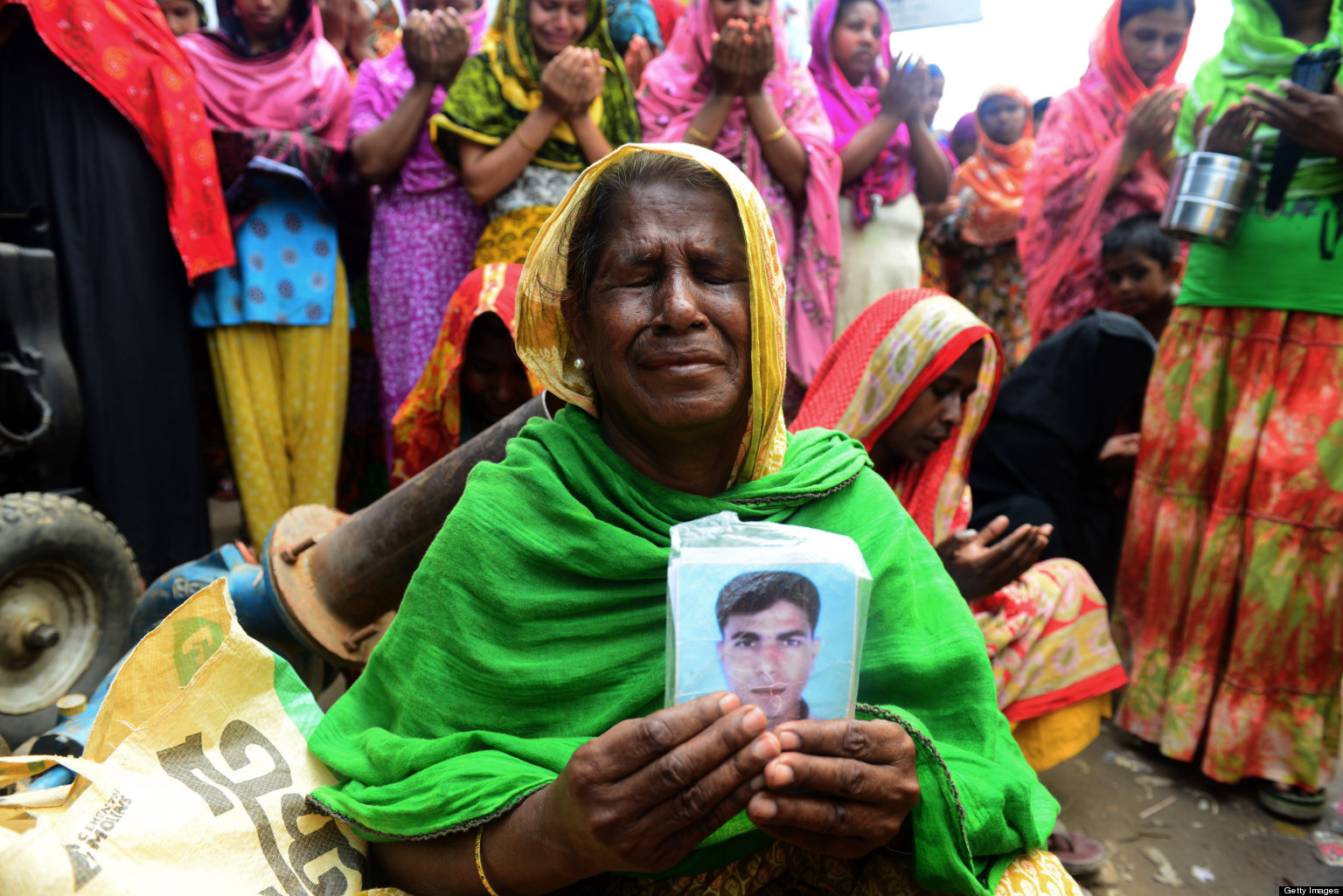
by Admin | Jul 1, 2013 | Papers & Reports, Highlights
What has happened since over 1,100 garment workers, mostly poor women, were killed in last month’s Bangladesh building collapse? Attempts are underway to better regulate the 5,000 garment factories in Bangladesh (second only to China) which collectively generate $18 plus billion in annual revenues. Bangladesh garment exports tripled between 2005 and 2010 and are expected to triple again by 2020, thanks to wages well below China and Vietnam. The minimum wage in Bangladesh was one-fifth that of China.

(Photo by Huffington Post)
1.The Bangladesh government initially refused offers of assistance from foreign governments and the UN. agreed to international labor organization proposals that would make it easier for garment workers to unionize. The minimum wage for garment workers was also increased.
2. A five year Accord on Fire Building and Safety in Bangladesh was announced by major European retailers following negotiations with labor unions in Bangladesh. Purchases by these retailers – from Benetton and Carrefour to Marks & Spencer and H&M, the largest garment manufacturer in Bangladesh – cover roughly 1,000 factories. The signatories would pay for inspections and required renovations at factories over two years, with the cost to each retailer based on its share of each factory’s production. The cost to each company was estimated at $2.5 million over five years.
3. Walt Disney announced that it would stop production in Bangladesh. US retailers including The Gap have stopped short of signing the Accord because legally binding clauses might result in lawsuits in US courts.
4. Wal-Mart revoked authorization for over 250 factories making its garments. The company will hire an outside auditor to inspect 279 factories for building safety risk. Required renovations, once completed, will qualify a factory to be on Wal-Mart’s approved list. Wal-Mart also announced a hotline for garment workers to report hazardous conditions. Fire safety training for workers in all factories making Wal-Mart products in Bangladesh was also announced.
5. the Clean Clothes Campaign, based in the Netherlands, is pressing Western multinational apparel retailers to donate over 470 million to compensate the disaster victims.
Questions:
What more should foreign governments do? Garment production in Bangladesh boomed after the European Union allowed poor countries to export garments duty-free that were made of imported rather than just locally-produced fabric . Should such rule changes be phased in gradually?
- Are the multinational garment retailers doing enough to make amends? What more should they do?
- What about other multinationals making toys and other products in Bangladesh? Should they get on board, as 90% of Bangladeshi buildings are said to meet no building codes?
- Should the ILO, European Union and/or US government lead the development of international standards that require all exported goods that enter the world trading system to be made in factories that meet minimal standards for worker safety…with fines for companies that sell non-compliant merchandise?
- If you were the Bangladeshi prime minister, what would you do? What level of “outside” involvement would you welcome or reject?
_________________________________________
Professor John A. Quelch, Co-Founder, and Member of Board of Directors, Board of Thinkers, Boston Global Forum.
by Admin | Apr 30, 2013 | Highlights
As the so-called “digital divide” is made smaller and the world becomes “flatter,” it becomes increasingly important that new media technologies be used as instruments of good rather than evil.
Over the years, the broadly-defined social media has emerged from its fringe existence as a simple communication tool and grown into a formidable, indispensible force that helped change societies. From its origin as a relatively obscure environment for technological “nerds” to communicate with each other, Social Media became a magnificent social networking phenomenon overnight when FaceBook and Twitter played a vital role in the Arab Spring uprisings. It was the main tool used by the citizenry to challenge and even uproot governments in several countries and forced significant changes in many more. Social media has become an alarming term and sown fear in the ears and minds of dictators across the globe while sowing hope for significant change in the hearts and minds of the people they oppressed.
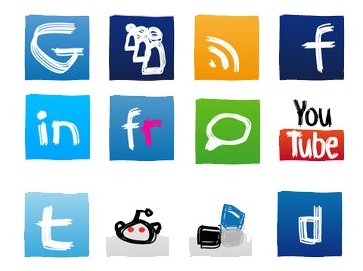
It all started in Tunisia on December 17, 2010 when Bouazizi, a street vendor, set himself afire to protest the harassment and humiliation inflicted upon him by government officials. The protest grew largely through the use of social media by the organizer to spread the message and mobilize the community. It led to the resignation, a mere four weeks later, of the president of Tunisia, who had been in power for 23 years. This stunning use of social media caught on quickly and used by protesters in other countries in the Arab world, albeit with different outcomes. To date, 17 countries in the Arab world had uprising and other forms of resistance started with and supported by social media. Social media have become a sine qua non in the modus operendi of the “oppressed” to organize, amass, and galvanize their comrades into a commendable force with a critical mass, both physically and intellectually, to make their voice heard and push their agenda. More often, it was used as a way to call for action or to broadcast location for the mass to gather for demonstrations or campaign rallies.
After the Boston Marathon bombing on April 15, 2013, social media once again grabbed global attention as their users took on the part of sleuth trying to help the government apprehend the suspects. The outcome this time was less than desirable. Despite of noble intention, the campaign led to the false accusation of a few innocent persons who had their social media pictures flashed on national TV’s and the front-page of respected national newspapers to go into hiding to avoid potential physical harm. A social media’s general manager actually apologized to its millions users and the victims for its role in fueling the rumors.
Unfortunately, intentional misuse of social media for malicious benefit, be it for public or private use, is frequent. Special interest groups and ill-intentioned individuals also resort to the use of social media to spread erroneous rumors for their gain. Their targets include political opponents, competing individuals, or companies. A quick attack that almost instantaneously spreads misinformation to millions of users exacts lasting damage and is difficult to defend. With data collected from millions of individuals, social media’s user database increasingly becomes target of hacking attempts to steal the user’s personal information.
As internet access gradually gains the status of a commodity, more financial institutions and retailers make their presence on-line and open up their business database to access by Internet users. Despite their best effort in securing their systems, hackers have succeeded in breaking through their digital defense and have stolen financial information, most commonly credit cards and identifying information, of their customers. Even government’s highly secured computers have been penetrated by the hackers.
Individual websites and blogs, moreover, are common prey of phishing attempts to steal login and passwords of visitors. Free email account users are also frequent target of hackers who steal their passwords and use their accounts to send spam emails to people in their contact lists.
Even though, hacking offenses and other misuse of the internet by nature do not directly inflict bodily harm on anyone, they do, however, create a constant fear for on-line users and computer professionals who are responsible for the security of their systems, and may destroy people’s reputations or financial lives. Far more dishearten news were the reports of teen suicides caused by the spiteful spreading of their unflattering pictures and bullying comments targeting them on social media. Thus, hacking and misuse of the internet disrupt peace and order in society and may indirectly leads to physical harm or death.
Terrorist organizations also have access to social media, they use it as a conduit for their propaganda and as a harvesting field. They use the media and their websites to spread their doctrines of hate, to reach out to impressionable and susceptible people to recruit them, and/or to incite them into being lone-wolf sympathizers spreading terror and destructive ideologies on their behalf. Even worse, they use the very social media and internet that were built to bring people together to spread the know-how on building low-tech, mass-destruction weapons that can be assembled in everyone’s kitchen, and whose primary purpose was spreading terror by killing and maiming innocent lives.
Social media certainly offer the world a double-sided sword. Its rapid transmission of voice, text, and audio/video to millions of people worldwide 24 hours a day provides a huge advantage to its users and would bring great benefit to our world — that is, if we used these media platforms wisely. Currently, the same advantage, however, is also exploited by terrorist organizations and other illicit groups to accomplish their destructive goals. The terrorist’s “personal” reach via the social media and the internet to susceptible, and often unsuspecting, targets is effective and should be deemed dangerous to society.
In a civilized and humane world, we protect and care for one another, we pursue common goals of peace, order, and democracy without infringing on the right of others or harming innocent lives. We need to find a way for our “beloved” and indispensable social media to be more accurate, reliable, and safe for everyone and to help us secure peace, safety, and prosperity for our society and the world-at-large.
Our reliance on the social media is a far cry from being Paul Revere, who rode his horse into the night to spread the news of the 1775 British attack on Boston and forewarn the “minutemen” Colonial army. It is simple to use in concept, but is a powerful communication tool with an extremely diverse, flexible, and sophisticate capability, if used wrongly, be it intentional or not, can cause far-reaching consequences, such as the way it was used by the public to find the Boston Marathon bombers, by the bullies to spread their attacks, and by terrorists to perpetrate their destructive acts. It is very important for us to harness the power and capability of social media and use them effectively to achieve our common goals. While FaceBook was purportedly created by one person, using it properly to protect our world and make it a better place is a problem with a solution beyond the capability of any one individual or group.
Call to Action:
We at the Boston Global Forum are calling for contributions from our “minutemen” army of thinkers, innovators, and leaders from academia, think tanks, industry, government, and armed forces across the globe to help identify real, practical solutions that we can use or develop to protect our life and property from sinister forces and, importantly, “to create a better, safer, and more peaceful world.” The most meaningful and innovative solutions will be honored and discussed at the BGF’s Annual Summit Conference October 2014 . at the Boston Public Library — the historic site where the bombs were set off in front of it on April 15, 2013, and shook the world.
April 30, 2013
Boston Global Forum
__________________________________
Long Nguyen, PhD, MPH is a contributor of Boston Global Forum and based in Boston, Massachusetts.
(WIth contributions from Alex Pattakos and Nguyen Anh Tuan.)

by Admin | Apr 30, 2013 | Event Updates
by Admin | Apr 28, 2013 | Event Updates
On April 2, Professor Michael Stanley Dukakis, the former Massachusetts governor, led a group of American scholars to visit the family of the late Prime Minister Vo Van Kiet and the Ho Chi Minh City National University.
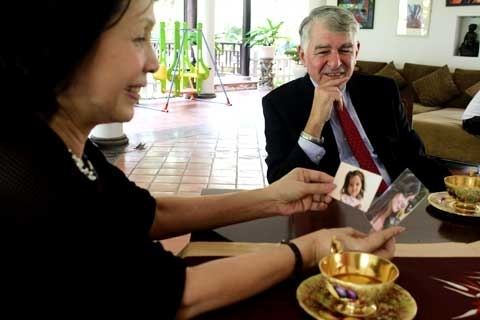 Professor Dukakis friendly talks with Mrs. Phan Hieu Dan, late Prime Minister Vo Van Kiet’s daughter.
Professor Dukakis friendly talks with Mrs. Phan Hieu Dan, late Prime Minister Vo Van Kiet’s daughter.
Professor Dukakis and American scholars had intimate conversations with family members, especially the late Prime Minister’s daughter, Mrs. Phan Hieu Dan.
Professor Dukakis expressed his admiration to and highly appreciated a number of reforms of the late Prime Minister Vo Van Kiet. He said that Mr. Kiet highly contributed to Vietnam’s renovation and open-door policy to extensively integrate into the world.
The former U.S. presidential candidate also shared his thoughts on national reconciliation, the work that was laid the foundation by the late Prime Minister during his tenures.
Professor Dukakis and the American scholars burned incense in memory of the late Prime Minister Vo Van Kiet at the family’s temple.
In response to Professor Dukakis and American scholars, Mrs. Phan Hieu Dan said that she was very touched and honored of Professor Dukakis’s deep sentiment for her father. On behalf of the family, she expressed her sincere thanks to Professor Dukakis and the American scholars.
“During his lifetime, my father was very interested in the issue of reconciliation, harmony for national unity. This has won the consensus and support of people who love peace all over the world. This is also the reason for Professor Dukakis to visit my family,” said Mrs. Dan.
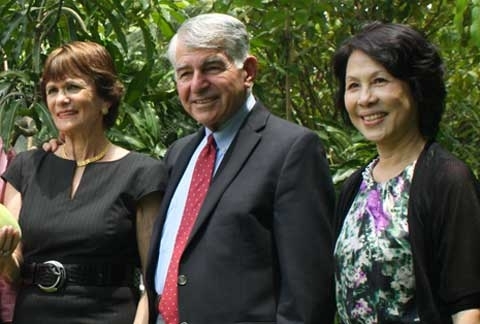 The American professor takes photo with Mrs. Hieu Dan.
The American professor takes photo with Mrs. Hieu Dan.
On the same day, Professor Dukakis and American scholars visited the Center for Nanostructured Materials Research and Manar Molecule of the National University of Ho Chi Minh City.
Professor Michael Stanley Dukakis is internationally known as the former Massachusetts governor, the most senior leader of the state of Massachusetts, who began his first term in 1975 and was re-elected twice in 1982 and 1986. Until now, Dukakis has been a famous face and full of influence in the state of Massachusetts as well as throughout the United States.
He was elected as the most capable governor by the National Association of the US Governors. As the Governor of Massachusetts, he helped this state achieve “miracles” in economic growth based on the development of high technology and financial services in the 80s.
He was also the presidential candidate of the Democrats, Bush’s opponent in the race for the White House in 1988.
Professor Dukakis is now the Chairman of the Boston Global Forum. In addition to the political path, Professor Dukakis is also a visiting professor of public policy at the University of California, Los Angeles.
Hanoi. April 02, 2013.
VietNamNet Bridge
by Admin | Apr 28, 2013 | News
Wish for a peaceful world and a developed US during President Obama’s second term was the main content of a talk between the Ho Chi Minh National Academy of Politics and Administration and former US President candidate Michael Dukakis in Hanoi on April 9.
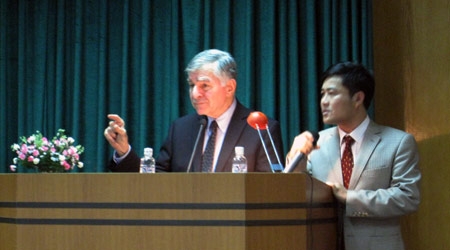
Prof. Michael Dukakis, former Governor of Massachusetts State and Chairman of the Boston Global Forum, expressed his desire to live in a world without wars.
He wondered about the US ’ military engagement policy in 150 countries, with over 830 military bases across the globe. He also emphasised the need to end the money-consuming global network war, which many countries are pursuing.
According to the US professor, building a world without nuclear weapons where everybody lives in peace and prosperity is the policy of President Obama as well as of the Vietnamese Government and other countries in the world.
He said he supports the peaceful settlement of all international disputes, suggesting an expansion of the United Nations Security Council’s members to 21.
Michael Dukakis expressed his belief that the US economy, especially the real estate market, will recover in the next four years under President Obama’s leadership.
During the first term of office, President Obama brought the US economy out of a recession and implemented an all-people health insurance policy for local residents, he added.
He highly valued the fine development of Vietnam-US relations over the past years, saying Vietnam is the best example of conciliation that countries engaged in war should follow.
Michael Dukakis is world-renowned as the former Massachusetts Governor, who served for three terms starting in 1975, 1982 and 1986. As a close friend of Vietnam , he took part in many demonstrations against the US war in Vietnam.-VNA.
Hanoi, April 10, 2013.
Vietnam+
by Admin | Apr 14, 2013 | Event Updates
The first shot fired by the Patriots on the Concord North Bridge near Boston, Massachusetts, in 1775 has been described as the “shot heard ‘round the world” and the beginning of the American Revolution. This historic event also represents the birth of a fledgling Nation, one driven soundly by the quest for personal freedoms and democratic ideals.
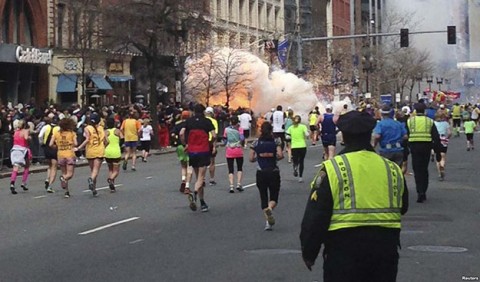
Another “shot heard ‘round the world” happened in the proud City of Boston on the day of the one of the country’s most famous athletic events, the Boston Marathon. This time, however, there was no Paul Revere around to alert the unsuspecting citizenry of an impending attack, nor did the attackers, whom we now refer to as “terrorists,” reveal themselves and their intentions. With no rules of engagement for waging what many call an act of war, the cowardly bombings that took place near the finish line of one of Boston’s finest traditions took and maimed the lives of many innocent victims. And in the context of what occurred not too far from Boston in 1775, this terrible act can be viewed as an assault on the very “personal freedoms and democratic ideals” that the Patriots of America’s colonial times so bravely fought to obtain.
On this tragic day and its immediate aftermath, ripples of terror could be felt across the Nation and the world. But the City of Boston did not stand still, nor did it give up and surrender. True to its history, Bostonians, along with so many “friends of Boston,” rose to the occasion just like their revolutionary ancestors during the period of our country’s birth. Once again, the people of Boston demonstrated, individually and collectively, that they are a true beacon of hope and inspiration for the Nation and the world. Moreover, they showed that “Boston Strong” is much more than a simple tag line; on the contrary, it comes with deep meaning and is an undeniable force to be reckoned with!
It is no wonder that one of Boston’s most historic neighborhoods is called “Beacon Hill.” Symbolically, especially at such an important time in Boston’s history, one could not choose a better name—one that conjures up fitting images of hope, inspiration, and innovation. And for a city that prides itself as being the “Athens of America” because of its vast intellectual and cultural roots and resources which, we should add, include its longstanding commitment to the Boston “Marathon,” another direct link to Greek antiquity, the image of Boston following the recent tragic events will not be tarnished. On the contrary, the defiant spirit of Bostonians, like the Spartans in ancient Greece, will not allow that to occur and, as a result, the image of their great, beloved City will only become stronger!
It is against this backdrop and within this resilient environment that the Boston Global Forum comes into existence. Indeed, there is no better place than Boston to engage the best minds from around the world to solve problems in positive, innovative, and meaningful ways. There is no better time than now to leverage the expertise and resources found within and linked to Boston in service to humanity. Both the Nation and the world are looking to Boston and observing how it responds to life’s most formidable challenges. The Boston Global Forum is an integral part of this response and, importantly, is destined to become a true manifestation of the deeper meaning of “Boston Strong.”
______________________________________________________
Alexander Pattakos, Ph.D., member of The Board of Thinkers, Boston Global Forum. Alex is the Co-founder of The OPA! Way®
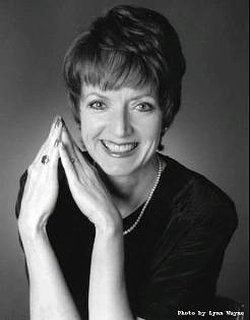
by Admin | Apr 13, 2013 | Members

Andrea Olmstead is the leading authority on modernist American composer Roger Sessions, with four books and a Grove article on Sessions: Roger Sessions and His Music (UMI Research Press, 1985), Conversations with Roger Sessions (Northeastern University Press, 1987), The Correspondence of Roger Sessions (Northeastern, 1992), The Revised New Grove Dictionary (2001) Sessions entry, and Roger Sessions: A Biography (Routledge, 2008). The biography documents Sessions’ work and life in great detail, providing intriguing and previously unavailable information, and charting five touchstone areas through Sessions’s 88 years—music, religion, politics, money, and sexuality—in addition to presenting a radically different view of his musical technique.
Olmstead is also the author of Juilliard: A History (University of Illinois Press, 1999) and of numerous articles in The Journal of Musicology, Perspectives of New Music, The Journal of the Arnold Schoenberg Institute, Tempo, Musical America, and The Musical Quarterly.
The recipient of three National Endowment for the Humanities Awards, Olmstead has also been a Visiting Scholar at the American Academy in Rome six times and a Fellow at the Virginia Center for the Creative Arts on four occasions. She has taught music history at conservatories for 36 years. Olmstead held the Christopher Hogwood Research Fellow for the Handel and Haydn Society Orchestra and Chorus from 2005-07
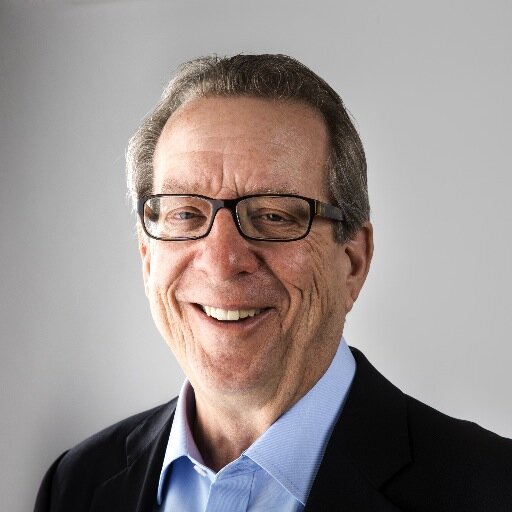
by Admin | Apr 13, 2013 | Editorial Board
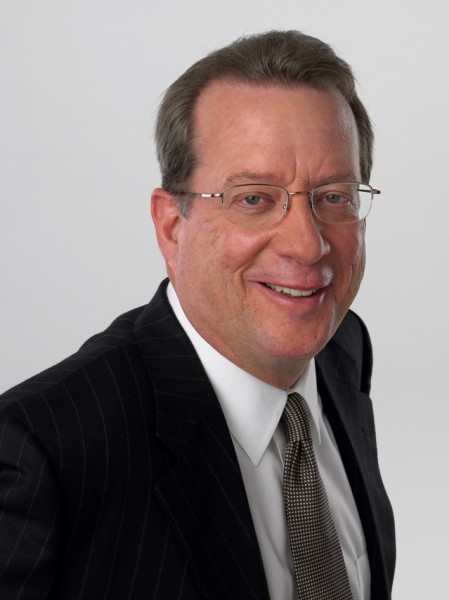
John Huey serves as Editor-in-Chief, overseeing the editorial content of all Time Inc.’s U.S. magazines, websites, and other digital content, including TIME, People, FORTUNE, Sports Illustrated, Entertainment Weekly, and Real Simple.
Before becoming Time Inc.’s sixth editor-in-chief in 2006, Huey served as editorial director of Time Inc. since July 2001. Before that, Huey was editor of the FORTUNE Group since February 2001. Previously, he was managing editor of FORTUNE since 1995. In 1997, while running FORTUNE, Huey was named Advertising Age‘s Editor of the Year. In 1998, he was named Adweek‘s Editor of the Year; and, under his leadership, FORTUNE was named to Advertising Age‘s list of the best magazines in both 1999 and 2001. Also in 2001, FORTUNE was ranked No. 1 on Adweek‘s “Hot List” of the industry’s top 10 magazines. Huey was named one of the top 10 magazine editors in the country by the Columbia Journalism Review.
A native of Atlanta, Huey graduated from the University of Georgia and served in the U.S. Navy as an intelligence officer before embarking on his journalistic career at a small weekly newspaper, the DeKalb New Era. He worked briefly at the Atlanta Constitution before joining the Dallas bureau of The Wall Street Journal in 1975. After a stint as the Journal‘s Atlanta bureau chief, Huey moved to Brussels in 1982 to help launch the Journal‘s European edition as its founding managing editor and later its editor.
Huey joined FORTUNE in 1988. In 1989, he was founding editor of Southpoint Magazine, a Time Inc. regional monthly that folded in 1990. In 1992, he co-authored Sam Walton: Made in America, the autobiography of the late founder of Wal-Mart. The book was on The New York Times best-seller list for several months.
Huey serves as a member of the Council on Foreign Relations and the Overseas Press Club. He is also an advisory board member of the Poynter Institute and sits on various non-profit boards.









